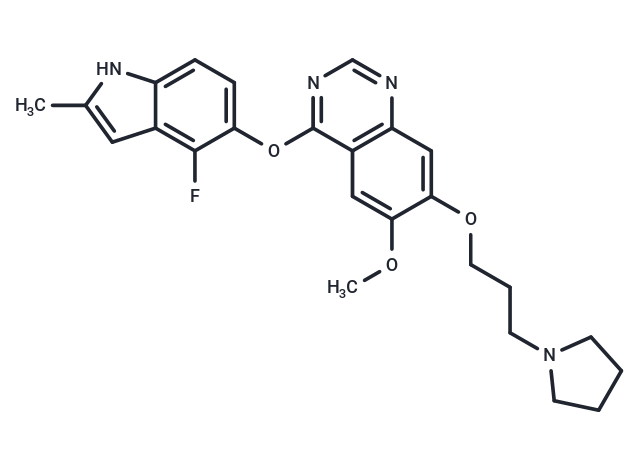Shopping Cart
- Remove All
 Your shopping cart is currently empty
Your shopping cart is currently empty

Cediranib (AZD2171) (AZD2171) is a highly potent (IC50 < 1 nmol/L) ATP-competitive inhibitor of recombinant KDR tyrosine kinase in vitro, also inhibits Flt1/4 (IC50: 5 nM/≤3 nM), similar activity against PDGFRβ and c-Kit, selective more for VEGFR than PDGFR-α (36-fold), CSF-1R (110-fold), and Flt3 (1000-fold) in HUVEC cells.

| Pack Size | Price | Availability | Quantity |
|---|---|---|---|
| 2 mg | $35 | In Stock | |
| 5 mg | $57 | In Stock | |
| 10 mg | $84 | In Stock | |
| 25 mg | $138 | In Stock | |
| 50 mg | $187 | In Stock | |
| 100 mg | $267 | In Stock | |
| 200 mg | $487 | In Stock | |
| 500 mg | $782 | In Stock | |
| 1 mL x 10 mM (in DMSO) | $63 | In Stock |
| Description | Cediranib (AZD2171) (AZD2171) is a highly potent (IC50 < 1 nmol/L) ATP-competitive inhibitor of recombinant KDR tyrosine kinase in vitro, also inhibits Flt1/4 (IC50: 5 nM/≤3 nM), similar activity against PDGFRβ and c-Kit, selective more for VEGFR than PDGFR-α (36-fold), CSF-1R (110-fold), and Flt3 (1000-fold) in HUVEC cells. |
| Targets&IC50 | FLK1:5 nM, FLT4:≤3 nM |
| In vitro | Cediranib exhibits highly effective and dose-dependent activity in human xenograft models. Additionally, Cediranib induces vascular regression in human lung cancer xenografts. It causes excessive skeletal growth, obstructs the production of corpora lutea in the ovaries, and inhibits physiological processes that are dependent on angiogenesis. |
| In vivo | In vitro, Cediranib directly inhibits the proliferation of tumor cells and blocks microtubule formation, while also suppressing angiogenesis induced by VEGF in vivo. Cediranib exhibits inhibition against bFGF (IC50: 0.5 μM) and EGF (IC50: 0.11 μM), and in the MG63 cell line, it inhibits PDGF-AA (IC50: 0.04 μM). Furthermore, Cediranib suppresses Flt-1 associated kinases (IC50: 5 nM) and exhibits inhibitory effects on the VEGF-C and VEGF-D receptors, Flt-4 (IC50 < 3 nM), in addition to inhibiting the tyrosine kinases c-Kit (IC50: 2 nM) and PDGFR-β (IC50: 5 nM). |
| Kinase Assay | Kinase inhibition: Cediranib is dissolved in DMSO at a concentration of 10 mM. All enzyme assays are run at, or just below, the respective Km for ATP (0.2 - 30 μM). The inhibitory activity of Cediranib is determined against a range of recombinant tyrosine kinases [KDR, Flt-1, Flt-4, c-Kit, PDGFRα, PDGFRβ, CSF-1R, Flt-3, FGFR1, Src, Abl, epidermal growth factor receptor (EGFR), ErbB2, Aurora A, and Aurora B] using ELISA. Selectivity versus CDK2 and CDK4 serine/threonine kinases is examined using scintillation proximity assays with a retinoblastoma substrate and [γ-sup>33P]ATP. Activity of Cediranib is compared to MAPK kinase (MEK), which shows dual specificity. It is determined using a MAPK substrate, [γ-33P]ATP, and paper capture/scintillation counting. |
| Cell Research | The proliferation of the HUVEC cell line is evaluated in the presence and absence of growth factors by measuring 3H-thymidine incorporation following a 4-day incubation period. Proliferation of MG63 osteosarcoma cells is induced by PDGF-AA, which selectively activates signaling of the PDGFRα homodimer. HUVEC and MG63 osteosarcoma cells are cultured in DMEM without phenol red containing 1% charcoal stripped FCS, 2 mM glutamine, and 1% nonessential amino acids for 24 hours. Cediranib or vehicle is added with PDGF-AA ligand (50 ng/mL) and plates incubated for another 72 hours. Cellular proliferation is determined using bromodeoxyuridine ELISA. (Only for Reference) |
| Alias | NSC-732208, AZD2171 |
| Molecular Weight | 450.51 |
| Formula | C25H27FN4O3 |
| Cas No. | 288383-20-0 |
| Smiles | O(C=1C2=C(C=C(OCCCN3CCCC3)C(OC)=C2)N=CN1)C=4C(F)=C5C(=CC4)NC(C)=C5 |
| Relative Density. | 1.285 |
| Storage | Powder: -20°C for 3 years | In solvent: -80°C for 1 year | Shipping with blue ice. | |||||||||||||||||||||||||||||||||||
| Solubility Information | H2O: < 1 mg/mL (insoluble or slightly soluble) DMSO: 83 mg/mL (184.2 mM) Ethanol: < 1 mg/mL (insoluble or slightly soluble) | |||||||||||||||||||||||||||||||||||
Solution Preparation Table | ||||||||||||||||||||||||||||||||||||
DMSO
| ||||||||||||||||||||||||||||||||||||

Copyright © 2015-2024 TargetMol Chemicals Inc. All Rights Reserved.